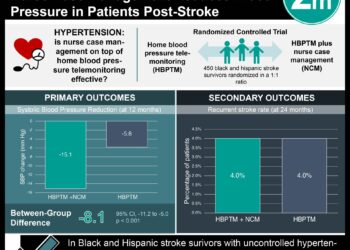Treatment of hypertension in low-risk patients not linked with improved outcomes
1. In this retrospective cohort study of low-risk patients with mild hypertension, treatment of hypertension was not linked to any change in mortality or cardiovascular disease.
2. In this low-risk population, treatment of hypertension was associated with increased risk of therapy-related adverse events including hypotension, syncope, and electrolyte abnormalities.
Evidence Rating Level: 2 (Good)
Study Rundown: Currently, the American Heart Association recommends pharmacologic treatment in high-risk patients with a blood pressure of 130/80 mm Hg or higher and for all individuals with a blood pressure of 140/90mmHg or higher regardless of risk. The benefit of treating low-risk patients with mild (sustained blood pressure of 140/90-159/99mmHg) hypertension is not clear as these patients are not frequently included in trials given the low incidence rate of major cardiovascular events. The current study is a retrospective longitudinal cohort trial of low-risk patients with mild hypertension and compared mortality, and cardiovascular outcomes between those who received antihypertensive therapy and those who did not. The study found no benefit for pharmacologic therapy in this population, but there was demonstrated harm with adverse events noted to be more common in the therapy group.
The current study provides cautionary evidence towards the drive for therapy of hypertension in low-risk patients. These patients may benefit more from careful observation and non-pharmacologic therapy prior to the initiation of medications. The main strength of the study was the large cohort size. The limitations of the study included the documented cross-over between treatment and control arms, and retrospective design.
Click to read the study, published in JAMA Internal Medicine
Relevant Reading: Effect of Intensive Versus Standard Clinic-Based Hypertension Management on Ambulatory Blood Pressure
In-Depth [retrospective cohort]: This is a retrospective cohort study using data from the Clinical Practice Research Datalink in England, and included participants from 1998 to 2015. Patients were included if they had mild hypertension (140/90-159/99 mmHg) and low cardiovascular disease (CVD) risk. Patients were excluded if they had a history of CVD, left ventricular hypertrophy, atrial fibrillation, diabetes, chronic kidney disease, or family history of premature heart disease. Matched control cases of patients who did not receive antihypertensive therapy was obtained using propensity score and nearest-neighbour analysis.
A total of 19,143 treated patients were matched to untreated controls with a median follow-up of 5.8 years. There was no observed differences in mortality (hazard ratio [HR], 1.02; 95%CI, 0.88-1.17) or CVD (HR, 1.09; 95%CI, 0.95-1.25). Therapy was associated with a higher risk of adverse events including hypotension (HR, 1.69; 95%CI, 1.30-2.20), syncope (HR, 1.28; 95%CI, 1.10-1.50), electrolyte abnormalities (HR, 1.72; 95%CI, 1.12-2.65), and acute kidney injury (HR, 1.37; 95%CI, 1.00-1.88).
Image: PD
©2018 2 Minute Medicine, Inc. All rights reserved. No works may be reproduced without expressed written consent from 2 Minute Medicine, Inc. Inquire about licensing here. No article should be construed as medical advice and is not intended as such by the authors or by 2 Minute Medicine, Inc.







